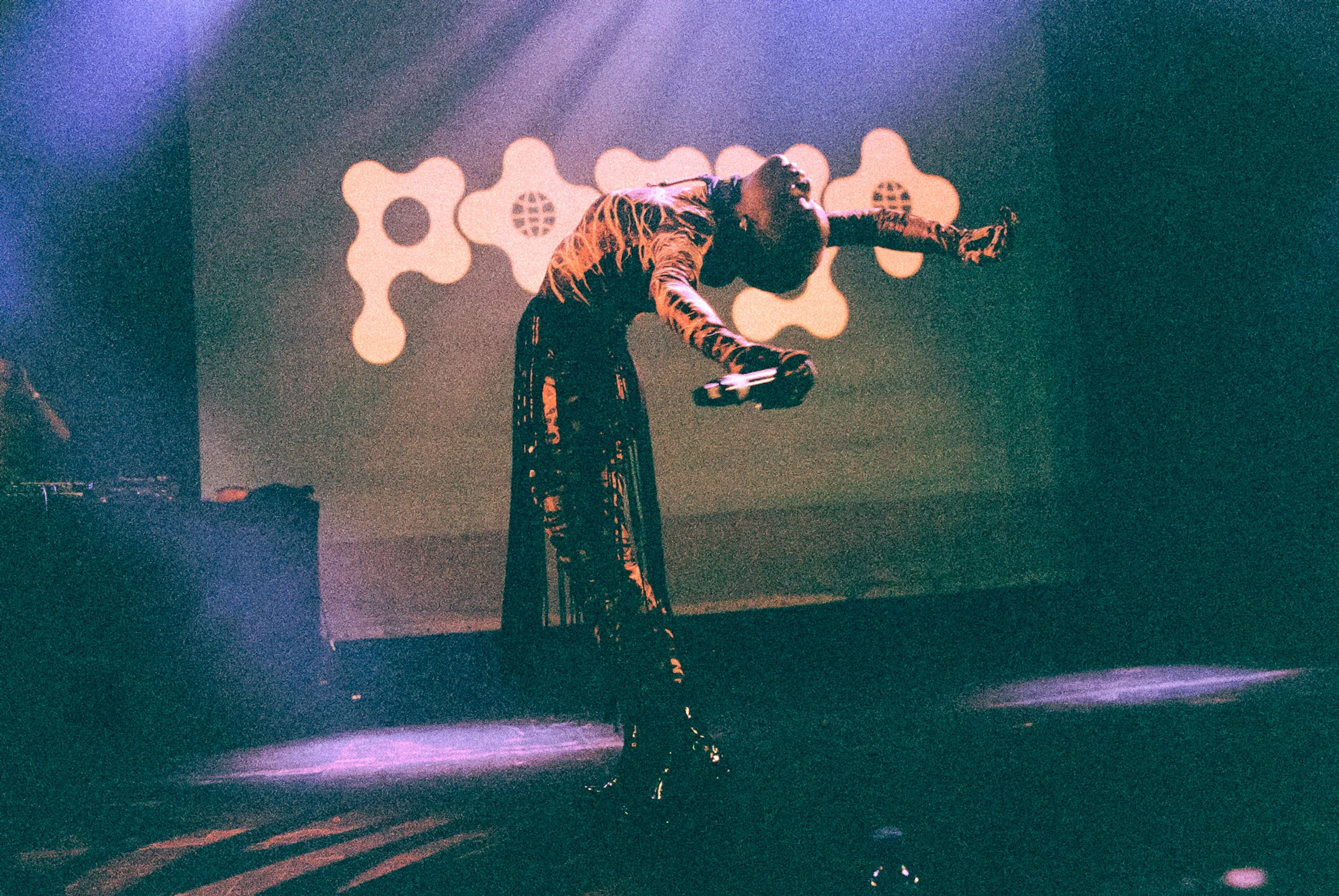
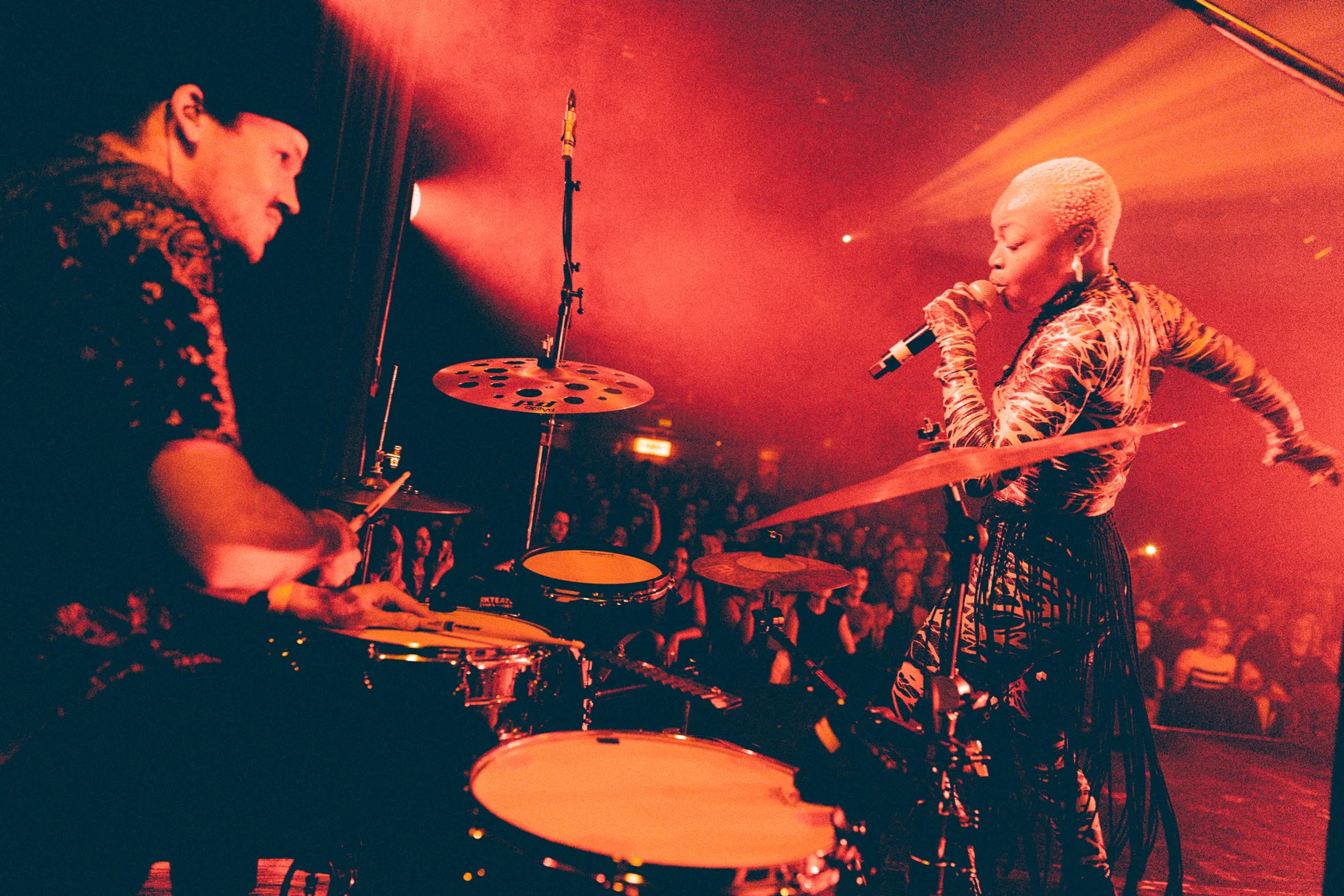
Angolan-Portuguese performer Pongo, music’s reigning Queen of Kuduro, is renowned for her high-octane dance music, and the frenetic choreography she delivers on stage. But don’t discount the importance of her over-the-top outfits: fashion has long been Pongo’s secret weapon, projecting the confidence and creativity she cultivated in the face of adversity. Writer Hester Underhill caught up with Pongo to learn more about her musical journey and life in clothes.
Photos by Jonathan C. Vivaas Kise, taken during Pongo’s show in Oslo World on November 2, 2022.
I’ve always loved styling myself. When I’m performing, it’s a way of projecting my vibe to the audience.
It’s a few hours before her sold-out show in Madrid, and Pongo is deciding what to wear on stage. On the bed in her hotel room she’s laid out a pair of black cargo trousers made from parachute silk, a halter-neck crop top, and a corset-style belt with golden buckles. There’s also a pair of patent platform boots that are ankle-snappingly high. Most people would be nervous to walk down the stairs in such a pair, let alone perform the fast-paced dance routines Pongo’s planning. “I’ve had a lot of practice,” she says with a laugh.
Pongo has been on the road for over a year at this point, and the boots have already been put through their paces on stages from Ottawa to Oslo. Last night, she had a gig in Marseille, and tomorrow she’s off to perform at a festival in Formentera, an island near Ibiza.
On-stage get-ups so far have included a bright pink velour one-piece, and a metallic orange bodysuit paired with skin-tight green flares. Today, her closely cropped hair is pink, but over the course of the tour, it’s gone through a rainbow spectrum of hues.
“I’ve always loved styling myself,” she says. “And when I’m performing, it’s a way of projecting my vibe to the audience.” But it’s not just about the look: “I’ll always try out all my moves in the clothes before I perform. I need to be able to do a lot of jumping and be sure nothing’s going to rip while I’m dancing.”
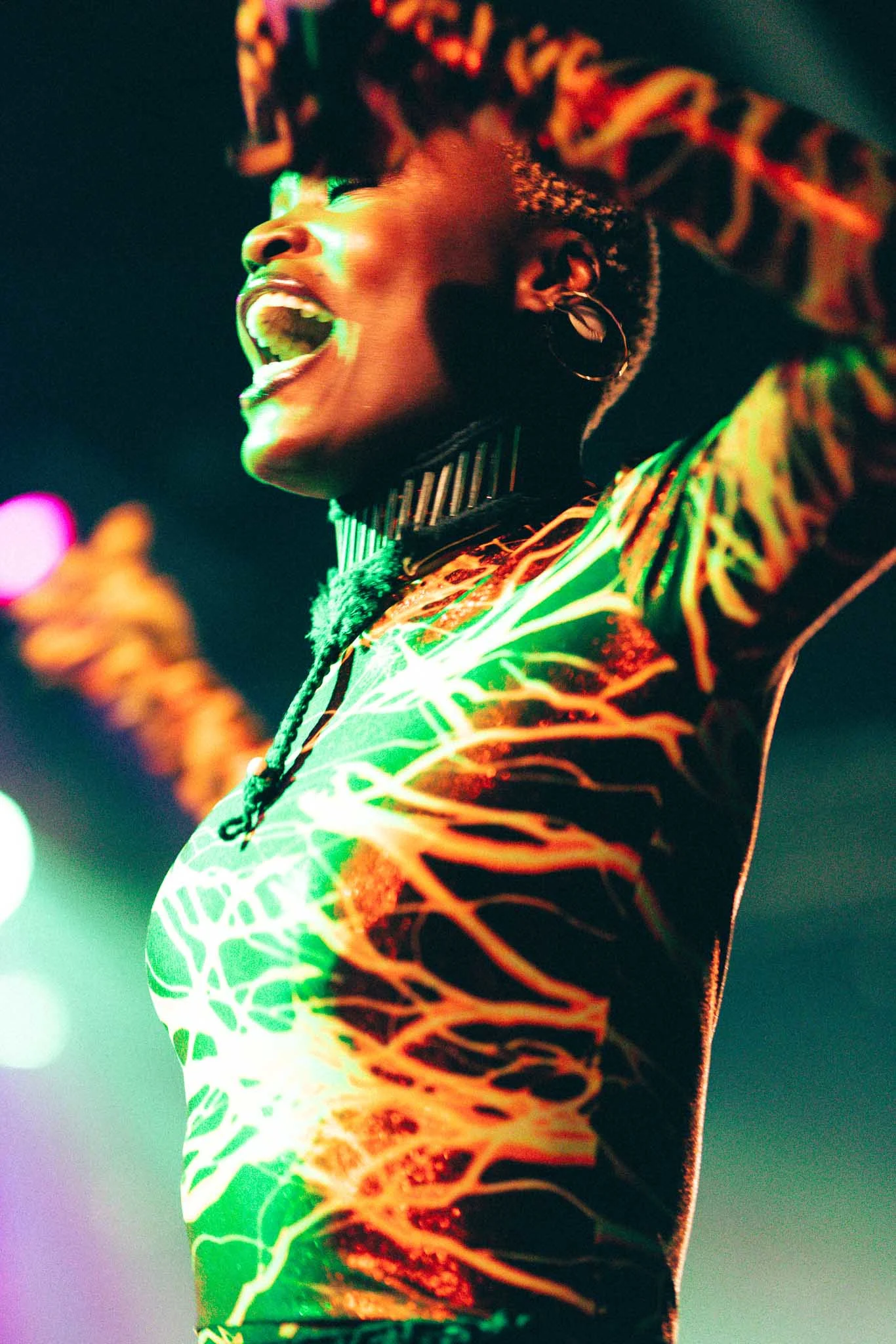
Known as the “Queen of Kuduro”—an electronic music and dance style native to Angola—Pongo ricochets across the stage floor with a dynamism that’s intoxicating to watch, all winding and popping, hip-shaking and high-kicking. These aren’t gigs for foot-tappers; they’re full-blown musical riots that keep crowds bouncing in exhilaration.
Kuduro emerged in Angola’s musseques(shantytowns) in the 1980s, during a protracted civil war. As Angolans fought for independence from Portugal, kuduro was a music of defiance—a celebration of life when so many were being lost to the conflict. Fittingly, Pongo’s new album “Sakidila”—which means “thank you” in Kimbundu, the language she grew up speaking—brims with gratitude not just for good times, but for the hardships and heartbreaks that made her who she is.
Pongo was born Engracia Domingos da Silva in the Angolan capital, Luanda. Her stage name is an homage to M’Pongo Love, a trailblazing Congolese musician who celebrated African women through her lyrics. This is something important for Pongo, too. The opening track of her new album, “Hey Linda,” is a message of empowerment to girls like her who grew up feeling out of place. “You know you're a diva,” she sings. “The podium is your place. Beautiful, black, curly hair is my crown.”
When she was eight, in the late 1990s, Pongo's family fled Angola to escape the war. For their first year in Europe, they were housed in a single hostel room in Lisbon.
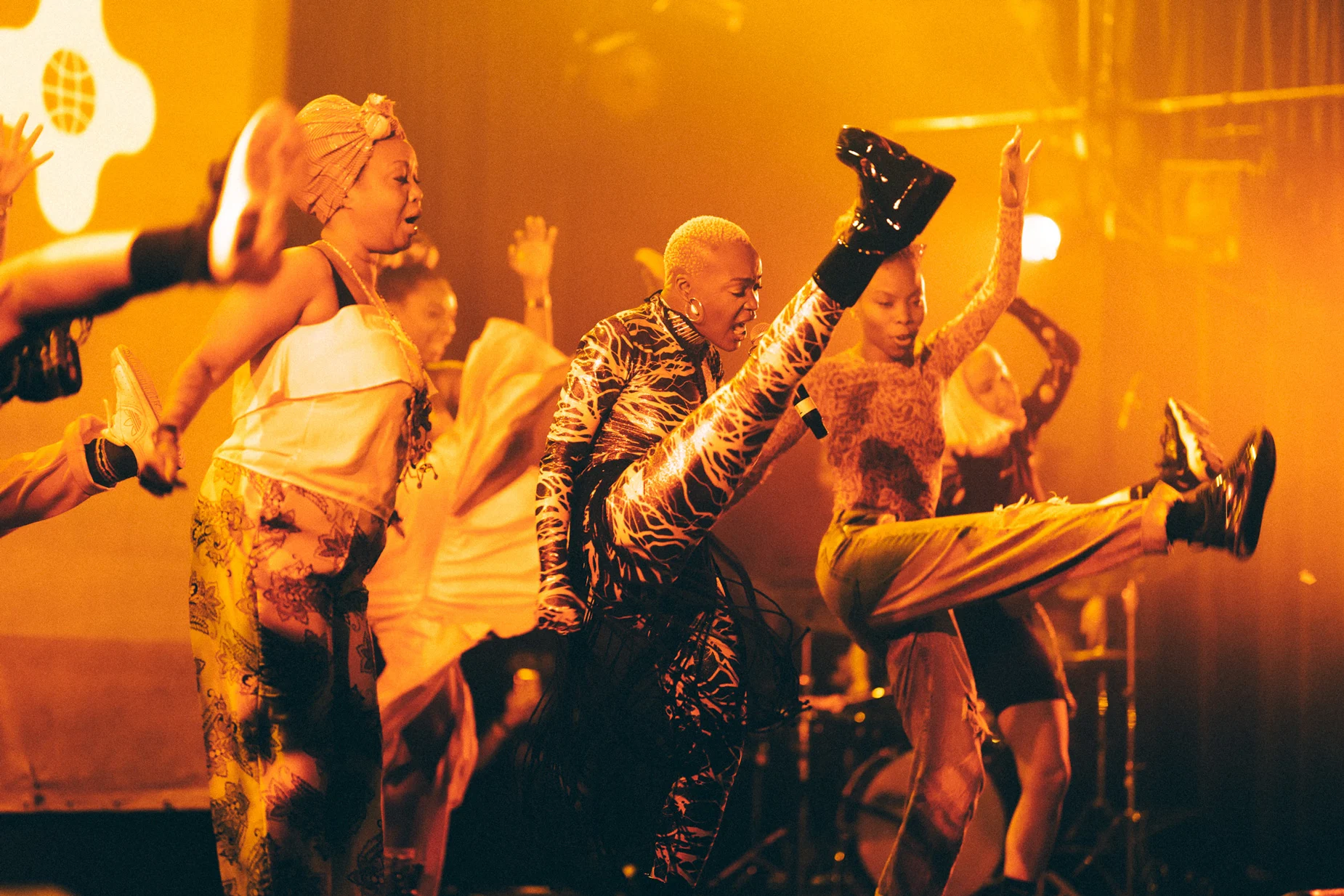
“Immigrant life, you know,” says Pongo. “Times were hard. My parents had to provide for four children.” She discovered kuduro at the age of 12, when she came across dance group Denon Squad performing in the streets of nearby Queluz. She joined the group as a dancer and later started rapping—something she initially hid from her father who, despite being a former street dancer himself, disapproved of her involvement in the scene.
But she couldn't hide it from him for long. During her time with Denon Squad, she was introduced to Portuguese dance music collective Buraka Som Sistema. In 2008, when Pongo was just 15, they enlisted her to provide vocals for their track “Kalemba (Wegue Wegue).” After touring with them for two years, she left the band and eventually quit music altogether. Trying to make a living through music proved difficult and, after her father walked out on her family, she needed a more stable source of income.
It wasn’t until Pongo was in her mid-20s and working as a cleaner that she decided to reenter the music game. In 2019, she released her first album, “Baia,” which acted as a statement of intent. “I came to take kuduro off the streets and take it to another level,” she sings on the title track.
The record received widespread acclaim for its reinvigorated kuduro rhythms, and Pongo's masterful lyrical stylings. This was followed up in 2020 with EP “Uwa,” which won her yet more international attention, and was described in the New York Times as “doing for kuduro what the Spanish pop star Rosalía has done for flamenco.”

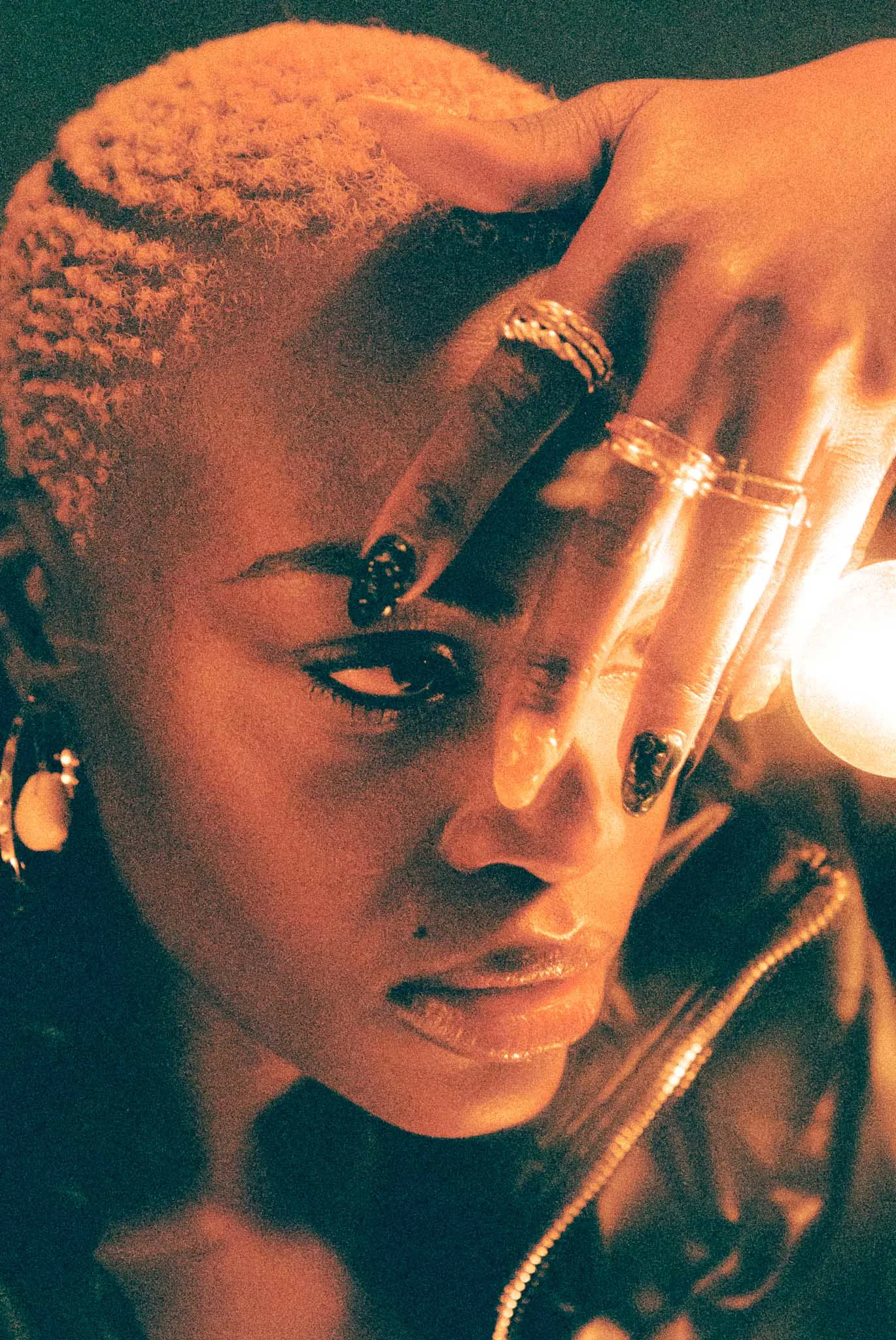
My family could never afford the latest trends. But that's what gave me some of my own style. It made me invent myself
Even before she became kuduro royalty, dressing up was important to Pongo. “It’s part of my roots,” she says. “We always wore our special clothes to go to church on Sundays. And in our culture, you put on beautiful clothes when someone is visiting your home.”
But when the family moved to Portugal, her clothes became a source of anxiety. They were a visual symbol of not only the cultural differences that set her apart from her classmates, but also the family's precarious finances. “My family could never afford the latest trends that the other kids in my school were wearing,” she says. “But that’s what gave me some of my own style. It made me invent myself. Sometimes difficult times make us creative.”
Resourcefulness is still a big part of her style. She's a keen second-hand shopper and regularly spends hours going through the racks at the vintage stores near her home in Lisbon. And she's no label snob—Pongo is just as likely to perform in a top from high-street retailer Bershka as any trendy new brand. There is one sequined Isabel Marant jacket she loves to wear on stage, but it's only on loan, she admits mournfully, and will have to be sent back at the end of the tour.
The outfits make me feel prepared. If I'm not feeling myself, nobody will be feeling me.
Pongo became a mother in 2014 and her daughter, she tells me, has inherited her eye for style. “From a very young age, she always chose her own outfits. She’s always had a clear idea of what she wants to wear and sometimes she likes to put on fashion shows and pretend to be a model,” she says. “I was the same when I was little. I'd do catwalks with my sisters where we'd dress up in our mum's shoes while she was out and wrap ourselves in bed sheets like long dresses.”
Her parental duties, however, often mean Pongo has less time to think about her stage outfits. “I mostly don’t have a lot of time in advance to think about what I’m going to wear on stage,” she says. “I'm always rushing around taking care of my daughter before a show. It’s a challenge every time. But I’m often at my most creative when I'm trying to find some solutions at the last minute.”
This was the case when she performed at Sónar festival in Barcelona this summer. Pongo wore a skin-tight, neon-pink two-piece ensemble that she'd been cutting and stitching right up until the moment she stepped out onto the stage. It was fashioned from a leotard she usually wore to the gym, and came complete with elbow-length gloves fashioned from its legs.
“The outfits make me feel prepared. And I'm the kind of person who thinks, if I'm not feeling myself, nobody will be feeling me.”
